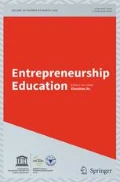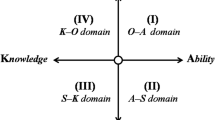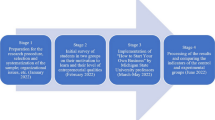Abstract
Entrepreneurship education and its evaluation appear complex due to the large spectrum of parameters and methods that affect its implementation and objectives. Hence, disperse outcomes from diverse entrepreneurial courses are expected. Inter-comparisons between courses’ outcomes are yet unclear lacking a commonly accepted framework for the representation of the results. The present article aims to provide empirical data from the application of a new dialectical framework for entrepreneurial factors affected from entrepreneurial instruction. This framework provides a two-dimensional pattern for Ability, Support, Knowledge and Opportunity (the ASKO framework) as a base for comparing entrepreneurial conceptualizations for different courses or pre–post-course outcomes. Results from different entrepreneurial courses, either in situ or online, are illustrated and discussed for distinct instructional methods. Additionally and for the primary ‘average’ conceptualization of potential trainees, a broader sample of alumni of a Greek university was contacted and compared with a random group of graduated or non-graduated adult learners and a group of undergraduates. ASKO results indicate that the majority conceives business knowledge, innovation adoption and the initial capital of the new firm as the most crucial factors for its success. Personal abilities appear underestimated toward success. Possible transformation of dominant conceptualizations revealed through the ASKO framework depends on efficient instruction for higher-level learning.





Similar content being viewed by others
Notes
As more thoroughly discussed in the theoretical part, Ability here refers to what an individual can do or thinks s/he is able to do, Support to whatever means (financial or human) are given to a new venture, Knowledge to anything ‘valid’ (or ‘known’) that contributes a firm’s creation, sustainability and growth and Opportunity to opportunity perception, i.e., a situation emerging from the market conceived as promising. Especially for opportunity (called also as entrepreneurial idea in a literature stream), the Austrian perspective is followed for the initial perception and not for a full identification and exploitation of the opportunity. The full identification and exploitation of the opportunity requires continuous human action that involves all the poles of the ASKO representation. A further discussion on the notion of opportunity is given by Sarasvathy et al. (2003).
In various entrepreneurial studies, the level of the analysis is the firm or the organization. For this entity, learning concepts emerge in the organizational context. Senge (1990) addresses how an organization learns, March (1991) models learning in organizations, and Argyris and Schön (1978) have addressed, more generally, the notion of organizational learning. In the present work, I restrict the level of analysis to individuals, i.e., learners who may participate in small groups of learners.
Nonparametric Spearman correlations were preferred, instead of Pearson ones, because Kolmogorov–Smirnov tests for variables O–A and K–S indicate that they are not normally distributed due to ranking.
This is consistent with the way students performed that year, probably advised by the ‘older’ ones, to just form efficient teams and present a business plan at the end of the (selective) course.
Both patterns are needed, as explained in section four (paragraph two), to ensure whether the given instruction affected or not the trainees.
References
Argyris, C., & Schön, D. A. (1978). Organizational learning: A theory of action perspective (Vol. 173). Reading, MA: Addison-Wesley.
Bird, B. (1995). Towards a theory of entrepreneurial competency. Advances in Entrepreneurship, Firm Emergence and Growth, 2, 51–72.
Bouchikhi, H. (1993). A constructivist framework for understanding entrepreneurship performance. Organization Studies, 14, 549–570.
Bygrave, W. D. (1993). Theory building in the entrepreneur paradigm. Journal of Business Venruring, 8(3), 255–280.
Bygrave, W. D., & Hofer, C. W. (1991). Theorizing about entrepreneurship. Entrepreneurship Theory and Practice, 16(2), 13–22.
Corbett, A. C., & Hmieleski, K. M. (2007). The conflicting cognitions of corporate entrepreneurs. Entrepreneurship Theory and Practice, 31(1), 103–121.
Dimov, D. (2007). Beyond the single-person, single-insight attribution in understanding entrepreneurial opportunities. Entrepreneurship Theory and Practice, 31(5), 713–731.
Dodd, S., & Anderson, A. R. (2007). Mumpsimus and the mything of the individualistic entrepreneur. International Small Business Journal, 25(4), 341–360.
Dodd, S. D., Jack, S., & Anderson, A. R. (2013). From admiration to abhorrence: the contentious appeal of entrepreneurship across Europe. Entrepreneurship and Regional Development, 25(1–2), 69–89.
European Commission. (2006). The Oslo agenda for entrepreneurship education in Europe. http://www.gvpartners.com/web/pdf/EC_Oslo_Agenda.pdf. Accessed 10 Sept 2018.
European Commission. (2013). Entrepreneurship 2020 Action Plan. http://ec.europa.eu/growth/smes/promoting-entrepreneurship/action-plan/index_en.htm. Accessed 10 Sept 2018.
Fayolle, A. (2013). Personal views on the future of entrepreneurship education. Entrepreneurship and Regional Development, 25(7–8), 692–701.
Fayolle, A., & Gailly, B. (2015). The impact of entrepreneurship education on entrepreneurial attitudes and intention: Hysteresis and persistence. Journal of Small Business Management, 53(1), 75–93.
Fiet, J. O. (2001). The theoretical side of teaching entrepreneurship. Journal of Business Venturing, 16(1), 1–24.
Honig, B. (2004). Entrepreneurship education: Toward a model of contingency-based business planning. Academy of Management Learning and Education, 3(3), 258–273.
Illeris, K. (2007). How we learn: Learning and non-learning in school and beyond. London: Routledge.
Kakouris, A. (2014). Using art to trigger critical reflection in entrepreneurship. Experiential Entrepreneurship Exercises Journal, 1(1), 26–33.
Kakouris, A. (2015). Entrepreneurship pedagogies in lifelong learning: emergence of criticality? Learning, Culture and Social Interaction, 6, 87–97.
Kakouris, A. (2016). Exploring entrepreneurial conceptions, beliefs and intentions of Greek graduates. International Journal of Entrepreneurial Behavior & Research, 22(1), 109–132.
Kakouris, A. (2017). Constructivist Entrepreneurial Teaching: The TeleCC Online Approach in Greece. In P. Jones, G. Maas, & L. Pittaway (Eds.), Entrepreneurship Education: New Perspectives on Entrepreneurship Education (pp. 235–258). Bingley, UK: Emerald Publishing Ltd.
Kakouris, A. (2018). The ASKO dialectical framework for inter-comparisons between entrepreneurial courses: Theoretical foundation. Entrepreneurship Education.
Kakouris, A., & Georgiadis, P. (2016). Analysing entrepreneurship education: A bibliometric survey pattern. Journal of Global Entrepreneurship Research, 6(1), 6.
March, J. G. (1991). Exploration and exploitation in organizational learning. Organization Science, 2(1), 71–87.
Minniti, M., & Bygrave, W. (2001). A dynamic model of entrepreneurial learning. Entrepreneurship Theory and Practice, 25(3), 5–16.
Mwasalwiba, E. S. (2010). Entrepreneurship education: A review of its objectives, teaching methods, and impact indicators. Education and Training, 52(1), 20–47.
Nicholson, L., & Anderson, A. R. (2005). News and nuances of the entrepreneurial myth and metaphor: Linguistic games in entrepreneurial sense-making and sense-giving. Entrepreneurship Theory and Practice, 29(2), 153–172.
Pittaway, L., & Cope, J. (2007). Simulating entrepreneurial learning integrating experiential and collaborative approaches to learning. Management Learning, 38(2), 211–233.
Politis, D. (2005). The process of entrepreneurial learning: A conceptual framework. Entrepreneurship Theory and Practice, 29(4), 399–424.
Sarasvathy, S. D., Dew, N., Velamuri, S. R., & Venkataraman, S. (2003). Three views of entrepreneurial opportunity. In: Handbook of entrepreneurship research (pp. 141–160). Springer.
Senge, P. M. (1990). The fifth discipline: The art and practice of the learning organization. New York: Doubleday.
Shane, S. (2000). Prior knowledge and the discovery of entrepreneurial opportunities. Organization Science, 11(4), 448–469.
Shane, S. (2003). A general theory of entrepreneurship: The individual-opportunity nexus. Cheltneham: Edward Elgar.
Shane, S., Locke, E. A., & Collins, C. J. (2003). Entrepreneurial motivation. Human Resource Management Review, 13(2), 257–279.
Shane, S., & Venkataraman, S. (2000). The promise of entrepreneurship as a field of research. Academy of Management Review, 25(1), 217–226.
Shepherd, D. A. (2004). Educating entrepreneurship students about emotion and learning from failure. Academy of Management Learning and Education, 3(3), 274–287.
Verheul, I., Wennekers, S., Audretsch, D., & Thurik, A. R. (2002). An eclectic theory of entrepreneurship: Policies, institutions and culture. In D. B. Audretsch, A. R. Thurik, I. Verheul, & A. R. M. Wennekers (Eds.), Entrepreneurship: Determinants and policy in a European–US comparison (pp. 11–81). Boston/Dordrecht: Kluwer Academic Publishers.
von Hippel, E. (1986). Lead users: A source of novel product concepts. Management Science, 32(7), 791–805.
Zahra, S. A., & George, G. (2002). Absorptive capacity: A review, reconceptualization, and extension. Academy of Management Review, 27(2), 185–203.
Acknowledgements
This work has been partly supported by the Greek Ministry of Education through the ‘Education and Lifelong Learning’ program at the National and Kapodistrian University of Athens. Some early ASKO results of were mentioned in ECEI 2008 conference. The author is grateful to Emeritus Professor P. Georgiadis for comments and encouragement and Mrs. Chelsea Lazaridou for proofreading and commenting the manuscript.
Author information
Authors and Affiliations
Corresponding author
Rights and permissions
About this article
Cite this article
Kakouris, A. The ASKO dialectical framework for inter-comparisons between entrepreneurial courses: empirical results from applications. Entrep Educ 1, 41–60 (2018). https://doi.org/10.1007/s41959-018-0004-9
Received:
Revised:
Accepted:
Published:
Issue Date:
DOI: https://doi.org/10.1007/s41959-018-0004-9




